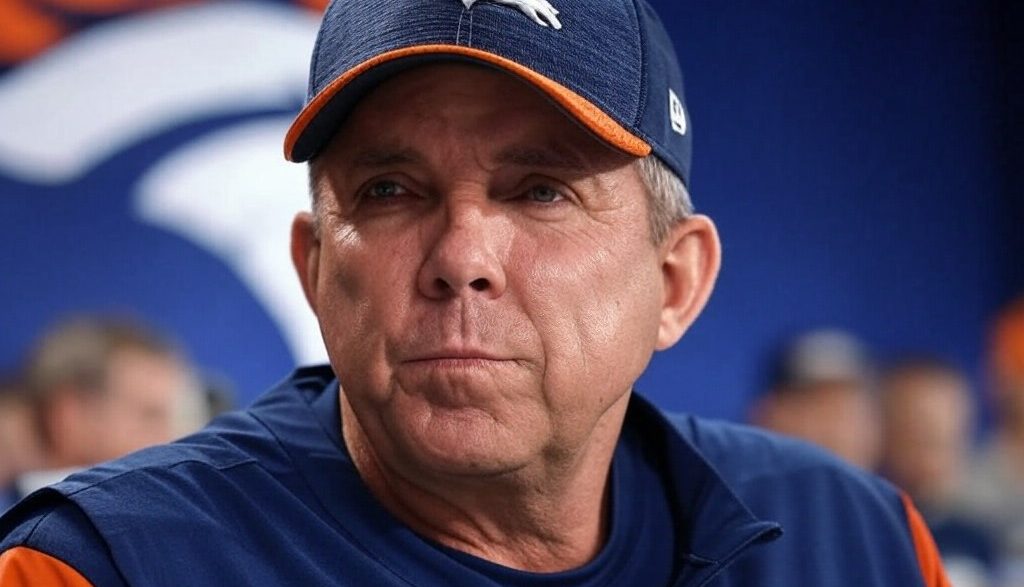In a wild ride that veered off track, Sean Payton’s Broncos ended their season not with a bang but a whimper. After the Buffalo Bills dominated them 31-7 in the AFC wild-card matchup, Payton candidly shared his reflections on calling plays with the awareness of Josh Allen’s prowess on the other side. It’s a stark reminder that sometimes, holding back can be just as costly as pressing forward.
During the first half, the Broncos’ offense was showing some spark, mixing in first and second down passes effectively, each netting around 10 yards per attempt. But as the third quarter unfolded, the gears seemed to grind to a halt. A pattern emerged: run, run, pass, and punt. This sequence became a familiar refrain as drives stalled and opportunities faded.
Broncos tight end Adam Trautman put it succinctly: “When they possess the ball, we can’t. We have to adapt, but today, they just owned the clock and the field.”
Bo Nix, Denver’s promising rookie quarterback, found himself in a tough spot. Down two touchdowns late in the third, a conservative play sequence unraveled any hopes of a resurgence. A short run, a penalty, and an incomplete pass built up to a punt, and a crucial fourth-and-2 effort fizzled when Jaleel McLaughlin was pushed out of bounds without making a dent.
Nix’s assessment of the day’s struggles was straightforward. “We’ve got to find the end zone more consistently in these big games,” he admitted. “Baltimore saw only 10 points from us, and today just seven. It comes down to execution, and letting momentum ride on our side.”
Early aggressive moves like the fake punt pass to Marvin Mims Jr. showed promise and creativity. It was a strategic gambit that briefly silenced Buffalo’s Highmark Stadium, tilting the momentum in Denver’s favor. Yet, when it was time to capitalize, the peddle inexplicably hit the brake, halting forward progress.
That decision to punt on fourth down at Buffalo’s 39 symbolized the afternoon—a cautious step back rather than a bold lunge forward. “The analytical side just didn’t favor going for it there,” Payton explained, pointing to field position considerations. It might not have been the wrong call, technically, but in playoff football, timidity can feel like a chokehold.
Despite the loss, the Broncos have much to build on. They’ve found their quarterback in Nix, setting the table for future success. But the postseason spotlight revealed areas ripe for improvement: A more reliable ground game, stouter linebackers, and perhaps a bit more daring from the sideline.
The deactivation of rookie powerhouse Audric Estime in favor of Tyler Badie might have come back to haunt them, as Badie saw limited action. Payton’s decision was strategic, focusing on matching running styles to the game plan. But sometimes even the best-laid plans can’t predict the storm on the field.
In the end, the Bills’ relentless offense overshadowed the Broncos, racking up first downs and rushing yards with ease, almost dictating the game’s rhythm at will. Denver saw just two first downs to Buffalo’s eight after the first quarter—indicative of a day when nothing seemed to stick.
Adam Trautman summed up the wild swings succinctly: “In the NFL, and especially the playoffs, momentum changes everything. And it went away from us too quickly.”
The Broncos have grit, and while the distance to truly compete is narrowing, Sunday’s game highlighted that the journey isn’t over just yet. The Bills reminded them there’s still a significant gap to close—one filled with promise, building blocks, and hope for what’s next. As they look to the future, they’ll need to be ready to throw that crucial punch, not just absorb it.








